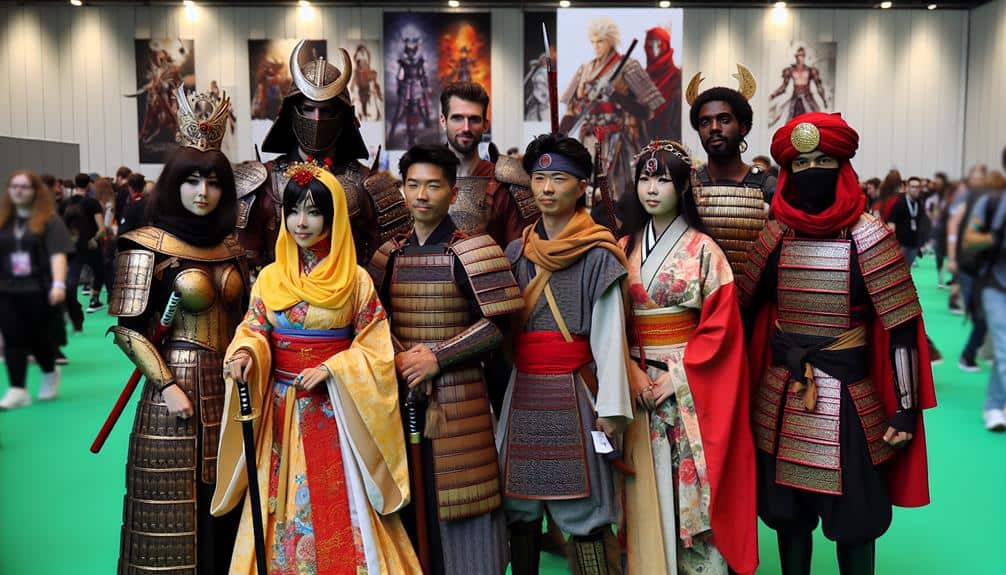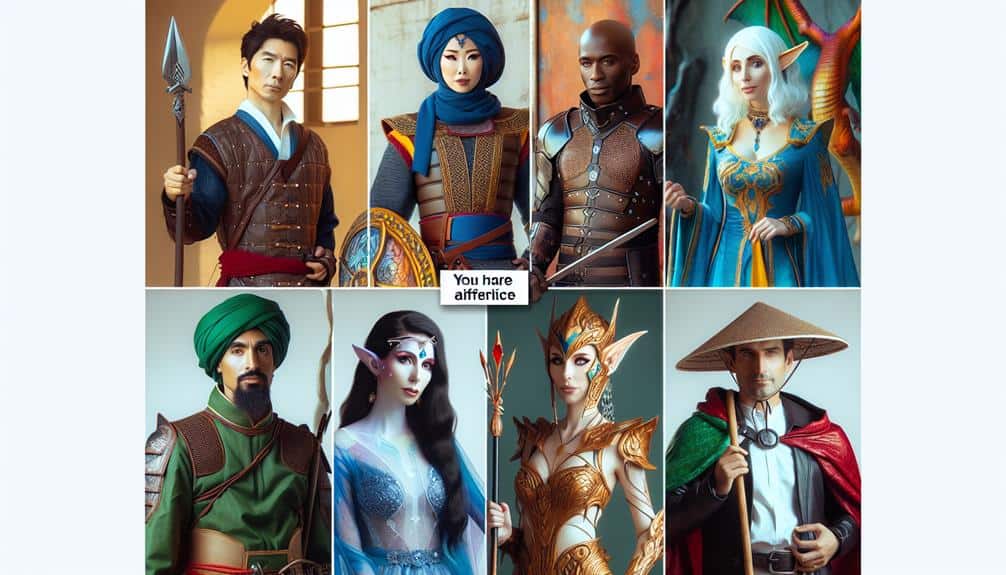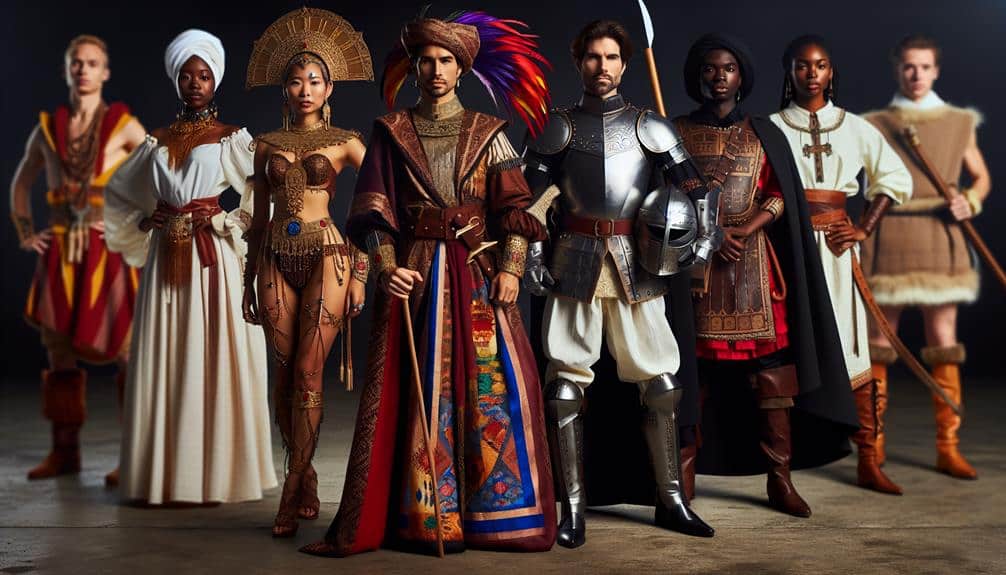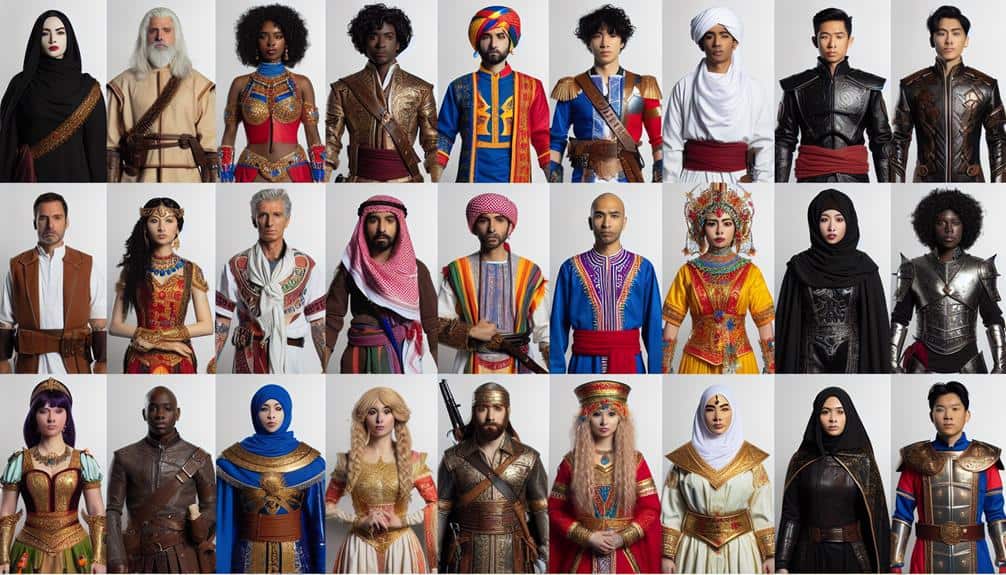When you observe a cosplayer dressed as a character from a different culture, it prompts you to ponder how cosplay costumes can be a powerful medium for conveying cultural messages.
The fusion of various cultural elements in cosplay attire opens up a dialogue about the significance of representation and diversity. This visual form of storytelling through costumes challenges preconceived notions and allows for a deeper exploration of the impact of cultural exchange.
The intricate details of a cosplay costume can hold layers of cultural meaning, inviting you to explore the complex interplay between identity, creativity, and societal norms.
Key Takeaways
- Cosplay costumes express cultural values and societal norms.
- Gender representation challenges and redefines traditional norms.
- Historical accuracy educates about cultural context and heritage.
- Embracing ethnic diversity enriches character portrayal and fosters inclusivity.
Impact of Cosplay Costumes on Society
Cosplay costumes serve as vehicles for conveying cultural messages and influencing societal norms and perceptions. When individuals engage in cosplay, they aren't merely dressing up as fictional characters; they're making a statement about social acceptance and identity expression. The act of donning a cosplay costume can be a powerful tool for individuals to explore different facets of their identity and express themselves in ways that may not be possible in their everyday lives.
In the domain of social acceptance, cosplay allows individuals to connect with like-minded people who share their passion for a particular character or series. This sense of belonging can be empowering, as it fosters a community where people can feel accepted and understood. Additionally, by embodying a character through cosplay, individuals can step into a different persona and experience a sense of freedom and creativity that may not be readily available in their day-to-day lives.
Representation of Cultural Icons in Cosplay
Exploring the domain of cosplay costumes further reveals how individuals embody cultural icons, shaping narratives that reflect societal values and ideologies. Gender representation plays a significant role in the portrayal of cultural icons through cosplay. Cosplayers often challenge traditional gender norms by embodying characters regardless of their original gender. This fluid approach to gender representation in cosplay allows for a more important and dedicated representation of cultural icons.
Historical accuracy is another important aspect when it comes to representing cultural icons in cosplay. Cosplayers who aim for historical accuracy meticulously research and recreate details of costumes to accurately depict a specific time period or cultural reference. This attention to historical detail not only showcases dedication but also educates viewers about the historical context of the character being portrayed.
Significance of Ethnic Diversity in Cosplay
The inclusion of diverse ethnic backgrounds in cosplay enriches the representation of characters and fosters a more inclusive and culturally rich community. By embracing diversity inclusion in cosplay, individuals have the opportunity to celebrate various cultural heritages through their costumes and performances. This cultural celebration not only adds depth to the portrayal of characters but also enhances the overall experience for participants and spectators alike.
Ethnic diversity in cosplay allows for a broader exploration of characters from different backgrounds, promoting a more accurate reflection of the multicultural society we live in. It also opens up conversations about the significance of representation and the importance of acknowledging and respecting various cultural traditions.
Influence of Pop Culture on Cosplay
With the rise of mainstream media and the ever-evolving landscape of entertainment, pop culture exerts a significant influence on the trends and themes found in modern cosplay. The cosplay community is constantly evolving, drawing inspiration from popular movies, TV shows, video games, and other forms of media. This influence is evident in the costumes and characters cosplayers choose to embody.
Pop culture influence on cosplay sparks creativity and innovation within the community. As new trends emerge in movies or TV series, they often manifest in the choice of characters cosplayers wish to portray. For example, when a highly anticipated superhero movie is released, it's common to see a surge in cosplayers depicting those characters at conventions.
Trends in pop culture directly impact the cosplay community, shaping the costumes and performances seen at events. By staying attuned to these trends, cosplayers can remain current and relevant in their portrayals, showcasing their creativity and passion for the characters they bring to life. The dynamic relationship between pop culture and cosplay ensures that the art form continues to evolve and captivate audiences worldwide.
Challenging Stereotypes Through Cosplay
In the heart of the vibrant world of cosplay, stereotypes are being challenged through creative and empowering character portrayals by cosplayers. Cosplay serves as a platform for breaking boundaries and promoting inclusivity by allowing individuals to embody characters regardless of gender, race, or body type. Through their costumes and performances, cosplayers challenge traditional stereotypes and showcase a diverse range of characters that defy societal norms.
By embracing characters that may not align with their own identities, cosplayers promote inclusivity by demonstrating that anyone can embody any character they resonate with, regardless of their background. This inclusive approach to cosplay encourages individuals to explore and celebrate diversity, fostering a welcoming and accepting community where everyone can participate without fear of judgment.
Fundamentally, challenging stereotypes through cosplay not only empowers individuals to express themselves freely but also highlights the importance of representation and acceptance within the cosplay community. By breaking down barriers and promoting inclusivity, cosplayers play a significant role in shaping a more diverse and inclusive cultural landscape.
Frequently Asked Questions
How Do Cosplayers Choose Which Characters to Embody in Their Costumes?
When choosing characters to embody in cosplay, consider cultural representation and character diversity. You convey messages through your choices, showcasing various identities and narratives. Reflect on the impact and significance of the characters you bring to life.
What Role Do Gender Norms Play in the World of Cosplay?
Gender norms play a significant role in cosplay. In this world, 63% of cosplayers feel gender representation matters. It influences character choices and costume designs, impacting how cultural messages are conveyed through this form of creative expression.
Are There Specific Trends or Themes That Are Popular in Cosplay Culture?
In the domain of cosplay, popular trends often revolve around iconic characters from pop culture. Fan favorites like superheroes, anime protagonists, and video game legends frequently dominate conventions, showcasing a diverse array of creative interpretations.
When exploring cultural representation in cosplay, consider the impact of appropriation. Your sensitivity in costume choices is essential. Reflect on the message your outfit conveys. Embrace diversity and respect for the culture you draw inspiration from.
What Impact Does Social Media and Online Communities Have on the Cosplay Community?
Online influence shapes the cosplay community by fostering connections and sharing techniques. Community support encourages growth and diversity. Cosplay competitions and celebrity endorsements further elevate the craft, providing opportunities for recognition and inspiration.



